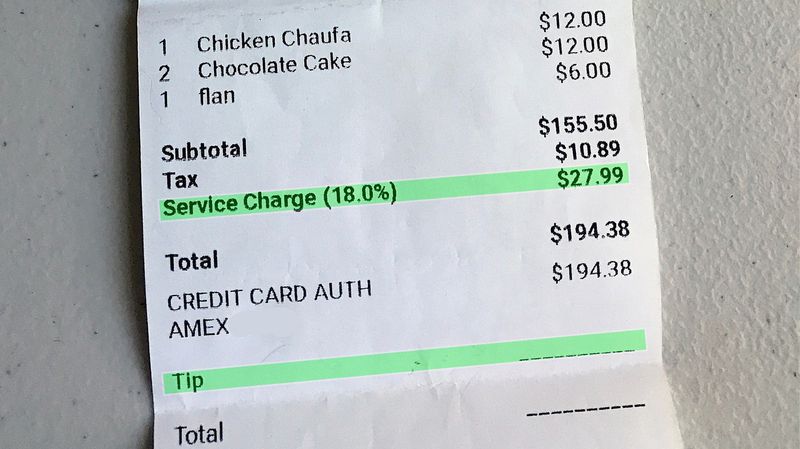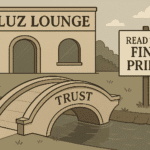By Tony Greenberg
“Clients don’t expect perfection from the service providers they hire, but they do expect honesty and transparency. There is no better way to demonstrate this than by acknowledging when a mistake has been made and humbly apologizing for it.” – Patrick Lencioni
I have a confession: I love to tip. I know the practice is problematic in many ways – from increasing racial inequity in compensation to making sexual harassment from customers more difficult to root out, to allowing the service economy to skirt our already inadequate minimum wage laws even further. I know both customers and businesses often hate it and feel trapped in a kind of prisoner’s dilemma where they can’t opt out of the system individually without depriving servers of a living wage or losing a competitive edge but would love for it to just disappear and for the US to Europeanize its approach to tipping. Nevertheless, just like the committed atheist Tim Minchin really likes Christmas, I’m a progressive who loves to tip. Yet not 15% for the privilege of taking out food from Gjusta and not 20% if I sit outside, of which almost none goes to the humble servers. Hiding fees behind service charges or vague fees is dishonest and misleading. Let’s make this illegal. Ask your server how much of this automated service change goes to them. Make the restaurant post it.
I Love Giving Freely
Why? The first reason is the same reason that I love Burning Man and go every year: giving freely is the most personally satisfying use of your resources. Tipping 25%-50% in cash to bring a smile to the face of someone who’s done a great job and was expecting a lot less from will give me more joy than upgrading from a $50 bottle of wine to a $100 one. And it’s specifically cash, so I know it goes directly to the hard workers I’ve made a personal connection with and not to some amorphous pool that the restaurant owner and everyone else has their hands in.
Secondly, that human connection matters now more than ever. As the director of the Harvard longitudinal study that gave us some of the best insight on health and happiness says: “Loneliness kills. It’s as powerful as smoking or alcoholism.” But as rich as we are in material goods, more and more of our human contact is replaced by screens. We live in an age of commoditization, automation and resulting alienation. Friendly shopkeepers of years past are replaced by faceless online retailers delivering packages to our door. Your banker is an ATM and soon enough your Uber / Lyft driver will be a robot. So in places where it still exists, the human touch and the extra effort is worth paying for. Doubly so when in this COVID-driven moment of social distancing people are now literally risking their lives to serve us.
Third, I’m a big believer in value-based pricing and rewarding the right chemistry between a customer and a service. My whole business is built on finding that fit in tech buying and the price of RampRate is always tied to our value, not our hours or expenses. I love Amanda Palmer’s Art of Asking and greatly admire Radiohead’s courage in generosity in releasing In Rainbows in the PWYW model all the way back in 2007. If there’s a secret entrepreneurial envy in me, it’s not of, say Google – it’s of Patreon. If I could rip up every contract and just say “pay a good, fair, tip” I would do it in a heartbeat.
But Not When It’s Forced
But as much as I love tipping as a gift and a gesture of personal connection and recognition, I hate it when it’s forced on me as a mandatory or, worse, hidden charge. A tip says “I see your hard work; I admire it and want you to feel appreciated; and as your performance goes above and beyond social convention so should your pay.” With a service charge, instead I feel like Johnny Rotten’s infamous phrase “ever get the feeling you’ve been cheated?”
Shortly before the social distancing shutdown, some friends and I visited a prominent sushi restaurant that automatically adds a 16% service charge to every order. Long story short, they botched the experience for us by charging us for a substitution that was driven by the restaurant running out of the fish that we wanted – which wound up forcing me to do my best Karen. And while the issue was cleared up, in that circumstance, the mandatory service charge felt especially egregious. There wasn’t an opportunity for me to express my discontent through a lower tip or to be generous in still giving the minimum despite a failed experience. The only message I got is “we don’t trust you to decide what the service is worth.” And less than 25% of the 16% went to workers. Isn’t this famous sushi restaurant making enough money?

Yet as much as emotionally it felt wrong, I completely understand the rationale because I know that unlike many of their peers, they do pay their servers a very fair wage. But this good corporate citizenship practice puts them in a prisoner’s dilemma – they are worried about having menu prices that are far out of line with the market, but also can’t afford to make up the generosity to their staff out of their thin margin. The mandatory service charge, as awkward as it is, is the half-measure that allows them to be fair to their employees while also not losing customers to sticker shock.
But while restaurants have a century of cultural expectations to fight, the proliferation of mandatory surcharges and nudges towards tips in other industries is a complete cash grab. For example, I was at Rainbow Acres, a nice grocery food store and was dumbfounded that when I rang up $100 in groceries, I was prompted with a screen to tip house 15, 20 or 25% of the total, including even the tax in the calculation. On groceries! This happens more and more in more and more places. Do I really want to give the coffee person who hates her job and was rude to me an automated 20% because a POS app nudged me into it?
Tips are an incentive for workers to manage a complex process. In a restaurant, they would watch the kitchen, ensure the meal arrives promptly while including all customization and accommodation to dietary restrictions / allergies that my crew requires, and provide appetizers / drinks to smooth over any delays. There’s a way to fail, to perform at a barely acceptable level and to really enhance the experience. But somehow it became an automatic — and ever-growing — surcharge that takes the customer’s agency out of it and leaves us feeling cheated.
Incentive or Coverup?
But as bad as these experiences are, they’re even worse when the human element is missing altogether and you’re not rewarding an individual but a corporation’s sliminess in hiding their fees. We’re facing a rampant, proliferating, often semi-secret fees that keep creeping onto our bills for a variety of goods and services. As this piece lays out, if you don’t have a choice about the amount being taken or who gets it, it’s a service charge, not a gratuity. At a time when there are more review sites, comment boards, price-comparison engines, machine-learning-driven interfaces and the like, why do companies think it’s good business to heap on semi-secret fees?
Ironically, the faults in these technical engines and comparison sites may be exactly what’s causing a race to the bottom to see who can hide their fees the best. There was some stunning news recently out of the ticket-buying industry – that all of the major online ticketing sites wanted to be up front about the fees and surcharges that can take up as much as 37% of a ticket’s face value. But none of them would do it without being forced to by law because the first one to do it would instantly look bad in all the search and price comparison engines. So they all supported a law making disclosure of fees mandatory to resolve their prisoner’s dilemma.
The same applies to the hospitality industry. Think about the last time you booked a hotel online. Whatever price you were quoted, when you looked at your final bill, did you get a surprise? Or was there a “resort fee,” regardless of whether you used their pool, gym and jacuzzi? Were there other unanticipated fees and charges, like 3 percent to provide employee healthcare (common in high-end Los Angeles restaurants, BTW)? Why not include that in the actual price of providing your service? Ah, because Kayak and Hipmunk and Expedia and Travelocity will all list you on the third page of results for your hotel class and location. So in many cases, individual businesses are not to blame and the right level of action is at a legislation – or at least an industry consortium collective level.
Why Have Some Not Learned?
But at a time when we have more options and alternatives for pretty much everything, why do some companies go even beyond their industry’s known flaws? I keep seeing companies trying to sneak fees through that only betray consumers and invite negative reactions, and I can’t help but think if they’ve really screwed up their internal culture and incentives. Is a hidden fee worth the marginal revenue you eke out of a customer this way? Is it worth the blowback when it becomes public, as it almost certainly will? Or is it just an executive collecting on a bonus by destroying the brand and then fleeing for a competitor when the jig is up boasting an “18% increase in gross margin.”
Here’s one that really drives me crazy. The sushi guys with the 16% surcharge at least had the decency to make that clear. But I’ve run into restaurants that charge a required 18-percent “gratuity” for service (especially for larger parties), and then provides a bill that includes a line so you can add even more. If you’re not paying attention after a few cocktails you can easily add a second 15- 20 percent, and end up paying as much as a third more for your meal. Santa Monica is getting it righter than most: “If a restaurant wants to charge more to help cover its costs, the safest and most transparent way is to simply raise prices.” — Chief Deputy City Attorney Adam Radinsky of Santa Monica. So is Harvard Business review.
But while I can forgive a lot of things to consumer businesses with a personal touch, large corporations without a personal touch have no business imposing mandatory hidden fees. But do they ever. For two decades, my team at RampRate has been advising organizations on how to get the best value from the complex IT contracts they sign for IT products like hosting, cloud services, CDNs and telephony. And one of the top issues we deal with is surprise and hidden charges the client didn’t anticipate.
At the same time, I’ve been investing in intriguing companies like RampRate, who use technology to ensure people get the product they expect for the price they wanted to pay
More and more, companies trying to pull the secret-fee fake won’t be able to hide. New technologies such as machine learning, blockchain, review sites, social media and more are creating a new era of transparency. As this new era comes into clearer focus, how does your company look? How will your company’s behavior and business model play in this new era? Let me know how you’re evolving to survive and thrive while maintaining integrity and responsibility to all of your stakeholders.
About RampRate
RampRate is an impact-focused global advisory and investment firm that elevates the way business does business.
- Creating Alignment of Vision:
- Whether it’s between profit and purpose, cost and value of tech investments, service quality and RFP win rate, or strategy and execution, RampRate combines rational, data-driven frameworks with guaranteed commitments to real-world outcomes to help both existing market leaders and emerging players make the best decisions and reach their potential for changing the world.
- Big Initiatives for Big Business:
- For large enterprises, including Microsoft, ViacomCBS, Nike, eBay, and more than 100 others, RampRate has enjoyed a 20 year track record of:
- Reducing cost, risk, time, and the carbon footprint of IT supply chains;
- Building trajectory-altering strategic plans, and
- Replacing greenwashing with authentic social impact.
- For large enterprises, including Microsoft, ViacomCBS, Nike, eBay, and more than 100 others, RampRate has enjoyed a 20 year track record of:
- Supercharging Startups
- For emerging leaders in tech, media, blockchain, and health, RampRate’s Advance practice helps innovative & impact-focused CEOs kick down the obstacles to their world-changing trajectory.
- We help streamline operations, provide technical roadmaps, and go-to-market plans.
- We facilitate transformational relationships with Fortune 1000 partners, influential advisors, and foundational clients.
RampRate’s commitment to impact is woven throughout our organization, from the clients we take on, to the strategies we build for them. From our foundation, which funds self-sustaining impact initiatives and superstars in tech and healthcare, through to our tightly integrated ecosystem of clients and partners. Our goal is a new type of wealth – measured in millions of lives changed for the better rather than just millions of dollars earned.
Contact us to find out how RampRate can elevate the way your business does business!
Share this:
- Share on LinkedIn (Opens in new window) LinkedIn
- Share on Facebook (Opens in new window) Facebook
- Share on X (Opens in new window) X
- Share on Pocket (Opens in new window) Pocket
- Share on Pinterest (Opens in new window) Pinterest
- Share on Tumblr (Opens in new window) Tumblr
- Share on Reddit (Opens in new window) Reddit
- Email a link to a friend (Opens in new window) Email
- Print (Opens in new window) Print










